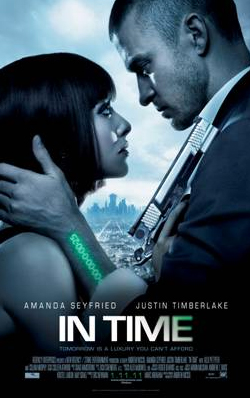In Time *
 Gattaca writer-director Andrew Niccol is normally apt at looking at current social issues in a near-future or parallel sci-fi world context. In Time appears to explore our obsession with youth, the death of urgency and the distribution of wealth – the latter being very topical at present with the global ‘Occupy’ anti-capitalist protests. However, Niccol’s latest dystopian offering is a prime example of looking great on paper, but not on screen, and squandering the opportunity to bring to life the highly thought-provoking debate it creates.
Gattaca writer-director Andrew Niccol is normally apt at looking at current social issues in a near-future or parallel sci-fi world context. In Time appears to explore our obsession with youth, the death of urgency and the distribution of wealth – the latter being very topical at present with the global ‘Occupy’ anti-capitalist protests. However, Niccol’s latest dystopian offering is a prime example of looking great on paper, but not on screen, and squandering the opportunity to bring to life the highly thought-provoking debate it creates.
In a future where time is the daily currency and people stop aging at 25, but are genetically engineered to live only one more year, for many it’s a day-to-day existence of buying extra time to survive, or timing out on the spot. After helping a wealthy, suicidal centenarian – who has wandered into the ghetto of Dayton – to escape the time bandits who want to steal his time, ‘time-poor’ Will Salas (Justin Timberlake) finds himself accused of murder and on the run with ‘time-rich’ hostage Sylvia Weis (Amanda Seyfried), the rebellious daughter of a time mogul. Their union becomes an important one in the fight against the unjust system.
Apart from feeling like you’ve sat through a naff comedian’s time-gag gig for 110 minutes, with a script that might well have been tongue-in-cheek time puns, but comes across as clichéd, tedious and groan-inducing, Niccol makes matters worse with some sloppy direction and choppy editing. In his aim to create a dystopia not too far-fetched in the current 21st Century imagination, he offers very little contrast to set it and its ideas adequately apart, creating a bland backdrop that does no credit to cinematographer Roger Deakins’ talents, and looks like a music video with a passion for old vintage cars at best. The only slightly intriguing quality is the sense of urgency of his shots, with those in the ghetto being snappier than the longer, laboured ones in the wealthy, time-filthy-rich district of New Greenwich of District 1. Will’s suspicious actions also serve as a nice contrast in these leisurely moments that stand him apart.
Even the exciting premise of good-looking leads Timberlake and Seyfried teaming up as a gun-toting Bonnie and Clyde, robbing the rich to feed the poor, begins to fade fast, once you’ve had your fill of the slick fashions, the flash cars and the humdrum cashes and punch-ups. Although edger in this than we have seen her before, Seyfried fails to bolster Timberlake’s action-hero, lead-role shortcomings, possibly because of his inexperience, but more to do with Timberlake lacking a dangerous edge and darker psyche that is required to demonstrate Will’s full coming-of-age arc in this. Most of the time, Seyfried just looks doe-eyed and detached, when not running and diving all over the place in impossibly high heels. In fact, Niccol fails his actors and their portrayals in not fully explaining the socialist implications of Will’s late father, or why humans only live until they are 25, or why Sylvia has never swam in the ocean – as you would expect from a rebellious rich kid.
Cillian Murphy as timekeeper cop Raymond Leon in pursuit of the couple-on-the-run is never intriguing enough to pull his character out of the average, leather-clad sci-fi authoritarian category, even though there is a brief hint as to his back story that comes a little too late to have any impact. Murphy always does ‘controlled maniac’ rather well, but there is never any sense as to how hard Leon struggles against his principles and exercised discipline in this to warrant him being merely clichéd and two-dimensional.
With such an original sci-fi concept that has a potent economic allegory that rouses interest in the first part then fizzles away as the action and serviceable acting dominates, you may well wish the clock display meter would run out on the lead characters – or worst, be wondering how to get back your own precious time after watching this disappointing effort.
1/5 stars
By @FilmGazer